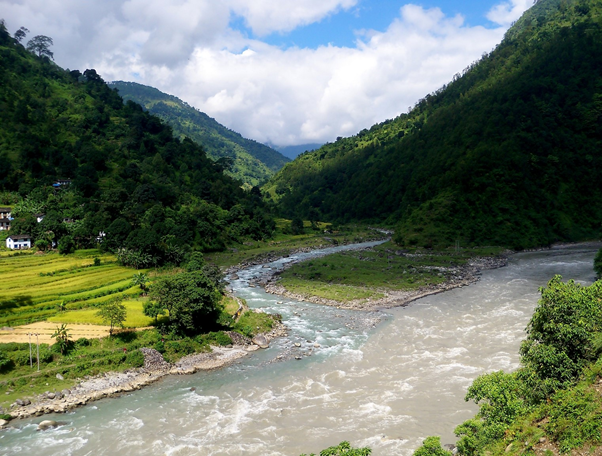As we exit Dehradun airport, it flashes through my head that I have forgotten to pack my briefs. We halt at a shop en route. Hand painted name board, poorly lit interiors organised to store rather than display. I feel a wave of nostalgia. The owner is grateful for this morning sale. Untouched by capitalism’s relentless drive to efficiently standardise the whole consumption experience. For all its benefits, there is a price to pay for the growing absence of soul in the ordinary transactions of our urban lives.
As we enter the ghat sections on the outskirts of Haridwar, what catches my attention is the speed of the river’s current. I am here with my 75-year-old mother during the Kumbh Mela. An event that returns in 12-year cycles, at which time a dip in the Ganges is considered deeply auspicious. An atonement of sins, a restoration of hope, a renewal of silence.
Outside the hotel are steps that end inside the Ganges. There is a chain to hold onto while we navigate the steps so that we are not swept away. It ends at a railing barricade. I see a young sadhu on the other side, holding it as he positions himself in the water. He lets go and disappears into the river. My eyes move downstream to search for him but he is gone.
The water is icy. As I immerse into it, I can feel my arteries and nerve pathways burst open with rapture.
We head for an early lunch to an eatery with the highest number of reviews on TripAdvisor. It has the kind of dingy ambience that comforts me. An infant at a far table catches my mother’s eye. She strikes a conversation with the family. The child’s mother died four days ago and they are here to complete the rituals. The weight of that information hangs onto us. My mother takes the child into her arms and returns with her to our table. She sits and closes her eyes. To not experience a mother’s presence is to be left untouched by God itself. The law of grace is inscrutable.
In the evening, Haridwar is overrun by the colour and commerce of rituals. We stay away from the crowds and roam the market instead. I buy a collection of beads for my wrist, to remind me not to get too lost in the world. We pass a food stall with mounds of puri and bhaji, where for Rs200 we can feed 15 hungry people, Rs400 for 30. An unsentimental group sits around the stall, ready to orchestrate a moment of charity.
Haridwar reminds me of how a jostling crowd in a noisy temple evokes a resistance in my spirit. Except on the steps leading to the river, whose cold velocity forces an elemental connection.
As we drive away early the next day after another dip, I ask Amma how the trip was. A dream come true, she says, as her face fills up with gratitude. It erases my sense of being underwhelmed. There are simpler ways to experience and embrace life.
We make a brief halt at a cave on the outskirts of Rishikesh. It is a place I love that I am returning to. The floor inside the cave is hard rock, lined with mats to sit on. The first light of day is a quiet whisper behind us. In its deep and dark recesses, we sit and return to the constancy of the breath.
An hour later I leave Amma and trace my way down a staircase cut with stones until I reach the riverbank. I step into the river here, while it is still slightly upstream of town. My stripped body is filled with the vibrancy of the waters as the soles of my feet use the sharp pebbles to navigate me in. Thoughts and words seem archaic at the foothills of the Himalayas. I settle into the river and submerge within until I am alone, floating in the blue light of the Ganges.
To be truly free is the slow certainty of having nowhere else to go.
Anand R. Raghavan is the Managing Director of Vijay Tanks & Vessels (P) Ltd.

